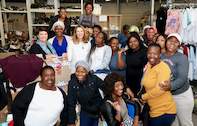
Since the inception of The Clothing Bank, the leadership team has learnt a tremendous amount about what women need to help themselves eradicate poverty.
In the beginning many assumptions were made, and the team thought that all the women needed was access to quality clothing at reasonable prices, some start-up capital and some basic business skills.
In hindsight, they realised that they were extremely naïve and had to develop a real understanding of what issues poor mothers of colour were facing in the townships of South Africa. After more than two decades since the end of apatheid, South Africa is still economically segregated because communities are not integrated.
Millions of black people live in townships, which are overcrowded and under-serviced. Crime levels are high, and on the rise as unemployed youth turn to crime.
Women often live in fear, HIV prevalence is still stubbornly high, and the abuse of alcohol and drugs is on the increase. Men are increasingly not taking responsibility for their children, which means single mothers are overwhelmed and many young girls fall pregnant without financial stability.
Once the team behind The Clothing Bank really understood what poor women in South Africa were facing, they could design a programme that had real impact on the lives of impoverished women. As a result, they had to make sure that they selected women who were determined and self-motivated to start their journey out of poverty.
The team came to the realisation that they couldn’t do it for them; the women needed to strive for a better life and be prepared to make sacrifices to make the change. This resulted in the development of a very detailed, six-step recruitment process to ensure that the team was investing their time, energy and resources in women who were motivated to change their economic circumstances.
The team had to design a program that set the women up for success, supported them emotionally and built their self-belief. They developed a support system that includes workshops focussed on life skills, financial discipline and business skills.
A large netowrk of life coaches has been set up to support the women emotionally to keep them focussed on persevering towards their goals. In addition, they have experienced business mentors that provide practical advice and monitor the women’s finances to ensure they build financial resilience, as well as counsellors who provide psychological support when the women lose hope.
The Clothing Bank provides 1 000 hours of training and support over a two year period, because the team found that this is the exact time a woman needs to transform from being dependent to be financially and socially independent.
This also resulted in the development of a personal roadmap for eradicating poverty that also allows the women to celebrate when they reach milestones.
One of the most important lessons the team learned however, is that there are no quick fixes, and that healing takes time. As a result of lessons learned on their journey of creating sustainable businesses, The Clothing Bank is now able to offer three additional programmes that support men, women in education and younger women.
